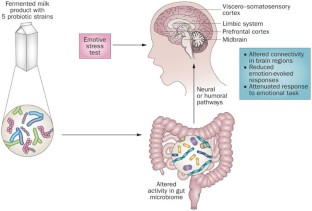Intestinal bacteria influence brain activity in healthy humans (original) (raw)
- News & Views
- Published: 07 May 2013
Gut microbiota
Nature Reviews Gastroenterology & Hepatology volume 10, pages 326–327 (2013)Cite this article
- 3752 Accesses
- 50 Citations
- 27 Altmetric
- Metrics details
Subjects
Emerging evidence indicates that the intestinal microbiota influence brain chemistry, development and behaviour in animals. Tillisch and colleagues now show that ingestion of selected probiotics changes brain connectivity and responses to emotional challenge in healthy humans, paving the way for therapeutic exploitation of the microbiome–brain axis for functional gastrointestinal and primary behavioural disorders.
This is a preview of subscription content, access via your institution
Access options
Subscribe to this journal
Receive 12 print issues and online access
$209.00 per year
only $17.42 per issue
Buy this article
- Purchase on SpringerLink
- Instant access to full article PDF
Prices may be subject to local taxes which are calculated during checkout
Additional access options:
Figure 1: Intestinal bacteria influence brain activity in healthy humans.

References
- Tillisch, K. et al. Consumption of fermented milk product with probiotic modulates brain activity. Gastroenterology http://dx.doi.org/10.1053/j.gastro.2013.02.043.
- Bercik, P. et al. The intestinal microbiota affect central levels of brain-derived neurotropic factor and behavior in mice. Gastroenterology 141, 599–609 (2011).
Article CAS Google Scholar - Collins, S.M., Surette, M. & Bercik, P. The interplay between the intestinal microbiota and the brain. Nat. Rev. Microbiol. 10, 735–742 (2012).
Article CAS Google Scholar - Cryan, J.F. & Dinan, T. G. Mind-altering microorganisms: the impact of the gut microbiota on brain and behaviour. Nat. Rev. Neurosci. 13, 701–712 (2012).
Article CAS Google Scholar - McNulty, N.P. et al. The impact of a consortium of fermented milk strains on the gut microbiome of gnotobiotic mice and monozygotic twins. Sci. Transl. Med. 3, 106ra106 (2011).
Article Google Scholar - Van Oudenhove, L. et al. Fatty acid-induced gut-brain signaling attenuates neural and behavioral effects of sad emotion in humans. J. Clin. Invest. 121, 3094–3099 (2011).
Article CAS Google Scholar - Schreiber, J. et al. Neurologic considerations in propionic acidemia. Mol. Genet. Metab. 105, 10–15 (2012).
Article CAS Google Scholar - Moayyedi, P. et al. The efficacy of probiotics in the treatment of irritable bowel syndrome: a systematic review. Gut 59, 325–332 (2010).
Article CAS Google Scholar - Foster, J.A. & McVey Neufeld, K. A. Gut–brain axis: how the microbiome influences anxiety and depression. Trends Neurosci. http://dx.doi.org/10.1016/j.tins.2013.01.005.
- Louis, P. Does the human gut microbiota contribute to the etiology of autism spectrum disorders? Dig. Dis. Sci. 57, 1987–1989 (2012).
Article Google Scholar
Acknowledgements
The authors are supported by grants from the Canadian Institutes of Health Research and by a grant in aid from the Nestlé Research Center.
Author information
Authors and Affiliations
- McMaster University Faculty of Health Sciences, Farncombe Family Digestive Health Research Institute, 1200 Main Street West, Hamilton, L8N 3ZS, ON, Canada
Stephen M. Collins & Premsyl Bercik
Authors
- Stephen M. Collins
You can also search for this author inPubMed Google Scholar - Premsyl Bercik
You can also search for this author inPubMed Google Scholar
Corresponding author
Correspondence toStephen M. Collins.
Ethics declarations
Competing interests
The authors have received a grant for research support from the Nestlé Research Center, Nestlé, Switzerland.
Rights and permissions
About this article
Cite this article
Collins, S., Bercik, P. Intestinal bacteria influence brain activity in healthy humans.Nat Rev Gastroenterol Hepatol 10, 326–327 (2013). https://doi.org/10.1038/nrgastro.2013.76
- Published: 07 May 2013
- Issue Date: June 2013
- DOI: https://doi.org/10.1038/nrgastro.2013.76